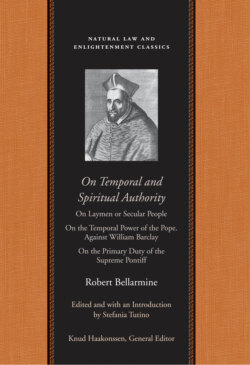Читать книгу On Temporal and Spiritual Authority - Robert Bellarmine - Страница 7
На сайте Литреса книга снята с продажи.
On Laymen
ОглавлениеThe first text in this edition is one of the Controversiae, On Laymen, part of the Controversia de Ecclesia militante, On the Militant Church, that is, the Church on earth. This work has three parts: on laymen, on the clergy, and on monks. It was part of the first volume of the Controversiae, the one that Sixtus V wanted to include in the Index.
The controversy on laymen presents a crucial theoretical basis for Bellarmine’s theory of the potestas indirecta. His arguments supporting the indirect power of the pope in temporal matters were a theoretical and historical response to the growing strength of both the Protestant territorial churches and the early modern states. They hinge on two ideas. The first is that political government is firmly grounded in natural and divine law and thus to an extent autonomous with respect to the Catholic Church. In other words, the political authority of sovereigns of the pre-Christian and non-Christian world was as legitimate as that of Christian princes. If this were not the case and if the Christian commonwealth were identical with the political commonwealth, the pope would have direct control not only over the souls but also over the bodies of Christians, who would be both political subjects and members of the Church of Rome.
The second key idea is that political government is not completely separate from the Christian Church: there is a point where the temporal and the spiritual spheres merge. That point is humanity’s ultimate end, the attainment of eternal life. This is a spiritual matter entrusted to the pope for the sake of which the temporal sovereign of a Christian realm must obey the pope as a superior, since in this respect the sovereign needs the spiritual counsel of the pope, just as his subjects do. Otherwise, temporal and spiritual authority would be completely separate and the pope would have no authority at all over Christian princes in temporal matters.
A large part of the controversy on laymen is devoted to the first of these premises: that political authority derives from natural and divine law. This doctrine had constituted one of the main arguments of the neo-Thomist School of Salamanca (the “Second Scholastic”), led by the Dominican Francisco de Vitoria. Vitoria and his pupils argued that government came from the law of God in order to refute the Protestant view that the legitimacy of government depended on God’s grace. The neo-Thomists rejected a Protestant reading of Augustine, according to which government was both the punishment and the remedy for humankind after the fall. On the contrary, for them the tendency to live in society was “natural,” proceeding from the law of nature, which was both the expression of God’s will and the manifestation of human rationality.15
An important corollary is that not only pagan princes, but even “wicked men,” as Bellarmine puts it in chapter 8, can hold legitimate political authority. It would be unfortunate to assume the contrary, that legitimate authority resides only in sovereigns graced by God: “Since grace and justice are entirely secret.... if grace were the title to sovereignty, it would follow that no sovereignty would be certain.” Another corollary is that every sovereign, including heretics and pagans, issues civil laws that are binding in conscience (On Laymen, chap. 11).
Despite differences, sometimes very significant, Bellarmine’s account of the origin of temporal authority agrees with Vitoria’s arguments; in fact, both doctrines were supposed to be on the Sistine Index. The reason why Sixtus V saw them as dangerous can be found, for example, in chapter 17. In that chapter Bellarmine wrote that once we ground political authority in natural law and affirm that political laws made by any sovereign are binding in conscience, “three errors” may arise. The first is one made by those who, “attributing too much to the magistrates,” argue that kings should be “not only the protectors and defenders of religion but also its judges and teachers.” Against this error, and referring the reader to his Controversia de summo Pontifice —which the pope also wanted to place on the Index—Bellarmine responded that “kings have the first place among Christians as Christian men, that is, as citizens of the earthly city, not as fellow citizens among the saints and servants of God, nor as members of the Church. For in this last respect the bishops have the first place, and the chief is the Supreme Pontiff.” While this response was a denial that the Christian Church and the political government were absolutely separate, it allowed a degree of autonomy to the latter with respect to the former and therefore, according to Sixtus, was not forceful enough in defending the pope’s supremacy and his plenitudo potestatis.
When Bellarmine, by contrast, discussed the other two errors, that the prince should not interfere in religion at all, and that the prince should seek peace and concord between Catholic and Protestant subjects rather than defending the one true religion, he offered responses that the Roman hierarchy did not question but instead embraced as very effective tools in the fight against the heretics.16 For example, Bellarmine stated strongly not only that no concord can be found or should ever be fostered among Protestants and Catholics (chap. 19), but also that heretical books must be eliminated (chap. 20) and that heretics themselves can and should receive spiritual as well as corporeal punishments, including death (chap. 21).
In a sense, then, the controversy on laymen demonstrates both how powerful Bellarmine’s theory of the indirect power of the popes was as an argument against heretics and, at the same time, how high a price the political and theological structure of post-Tridentine Catholicism would have to pay to adopt this argument.
